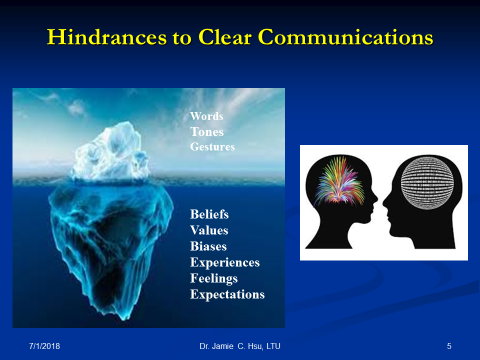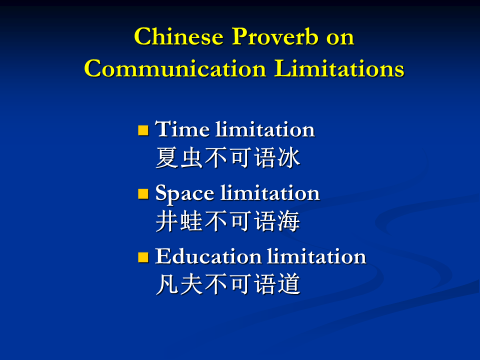
Why Is Clear Communication So Difficult?
– Musings of Dr. Jamie C. Hsu, 7.2.2018
Communication is such an interesting and complex endeavor of human beings. We talk, write, and even act to get our point across and our message delivered. Yet despite our earnest efforts, our communications are often met with blank looks from the receivers, and may even cause misunderstandings and bruised feelings.
There are many hindrances to clear communication — some are visible, some are invisible, some are due to the speaker’s lack of skills, and some are caused by the receiver’s perception. This is just like an iceberg. Above the surface, we can hear the words and the tone of speech, and we can see the gestures and expressions of the speaker. But underneath the surface, there are differences in the speaker’s and receiver’s experiences, beliefs, idiosyncrasies, and cultures. Such differences can cause varied interpretations of the same spoken words and visible facts.
It is very true that “Perception is reality,” and ”We don’t see/hear things as they are, we see/hear things as we are.”
The famous Chinese philosopher Zhuang Zi has observed the limitations in communication when the speaker and the receiver have different experiences in time span, location, and knowledge. He said “A summer insect can’t comprehend the cold of the snow. A frog in the well can’t imagine the vast of the ocean. And an illiterate person can’t understand the teaching of the guru.”
Effective communication requires us to have empathy, to be aware of our own intentions, and to appreciate the perspectives of others. A good way to practice effective communication is to have conversations with people of all ages and experiences, ranging from toddlers and teenagers to adults and retirees. Another good practice is to have a learning partner who will play back what you say and give you his/her interpretation and reaction.
With such awareness and continuous practice, you’ll be able to identify and remove the hindrances in your daily communication and become an effective communicator with your family, friends, and colleagues.


為什麼你的溝通總是出問題
-作者 許俊宸博士
-中譯 薛乃綺
溝通是人類如此有趣、卻又複雜的事情。我們會說、會寫、甚至採取行動與表情,讓別人明白自己的意思、讓自己的訊息得以傳達。儘管我們已經很認真努力,但我們的溝通卻常遇到對方聽不懂、或者是引起誤解而傷了彼此和氣。
溝通的確存在許多障礙;有些是有形的、有些是無形的;有時候是說的人缺少講話的技巧、有時候是聽的人的認知不同所造成的。這就像冰山一樣。表面上,我們聽到了說話的內容及音調,也看到講話的人的手勢跟表情。但在這個表象底下,說的人跟聽的人他們的經歷、信仰、特質及文化都存在著差異。而這些差異可能會導致即使聽到一樣的話、看到一樣的事情,卻產生不同的認識與解釋。
這就是俗語所说的,”印象感觉会被當成事實”、”我們對於看到/聽到的事物,都習慣以自己的立場來解讀”。
中國著名的哲學家─莊子,觀察到當說者與聽者因為不同的時節、不同的地區、不同的認知,而產生彼此溝通有所侷限。莊子道:”夏蟲不可語冰”、”井蛙不可語海”、”凡夫不可語道”。
有效的溝通要求我們要有同理心、要體認自己的用意、並且了解別人的觀點和看法。有个實踐有效溝通的好方法,就是跟各種年齡層或各式經歷的人對話,這對像可從孩童、年輕小夥子、忙碌的成年人,到閒逸的退休銀髮族。他们不同的背景会和你有不同的溝通。另外一個不錯的方式,就是找一個共同學習的夥伴,请他/她重復回應你所說的話,並且告诉你,他/她自己的解釋與反應。
有了這樣的認知與不斷地練習,你就能夠辨識及消除日常生活中的溝通障礙,成為一位能與家人、朋友、同事们進行有效溝通的人了。


